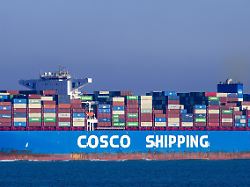China’s European “Port Road”
Are we making ourselves dependent on Hamburg and Piraeus?
By Andrea Sellmann and Mary Abelaziz-Ditzow
2/2/2023 7:38 am
Beijing has been investing in Europe’s ports for years. What is often kept secret: With a lot of know-how and sufficient money, China has partially raised Europe’s infrastructure to a new level. Do we have to thank – or is the bow stretched too far?
The Suez Canal is an important stage for container ships transporting goods from China to Europe. Because once you have passed it, you have reached the Mediterranean Sea. After two or three more days – depending on the weather and waves – the port of Piraeus comes into view. Not only Greek and European flags have been flying there for years, but also Chinese ones. Because the largest port in Greece is firmly in the hands of Chinese investors.
The entry of the Chinese came at the right time for Greece: The financial crisis in 2008 had hit the country hard and Greece was urgently looking for investors. First, Cosco, the China Ocean Shipping Company, secured management rights in 2009, and later shares in the port’s operating company. In 2016, Cosco increased its stake to 67 percent and has since been in charge as the majority shareholder.
Central hub of the new Silk Road
Alone, the Greek state would not have been able to raise the port to an internationally competitive level, reports Rolf Langhammereconomist at the Kiel Institute for the World Economy (IfW), in the podcast “Wirtschaft Welt & Weit”. For him, the better infrastructure not only ensures profits at Cosco, but also serves the other lines that operate in the port, such as Hapag-Lloyd.
Piraeus is increasingly becoming the central hub on the sea route of the new Silk Road, with which China is promoting the expansion of global trade routes. The German economist Jens Bastian lives in Greece and witnessed the expansion of the port. He sees it as a hub in a network of Chinese interests in ports and terminals that spans Egypt and Israel, Turkey and Western Europe, including Valencia and Zeebrugge.
Failed in Trieste
However, the Chinese failed in Trieste, Italy. The deep sea port there is particularly important for oil tankers. However, the Italians shied away from the geopolitical influence of the Chinese and preferred to rely on a European partner for the construction of a new multifunctional terminal with the Hamburg port logistics group HHLA.
In the largest German port in Hamburg, the signs point to a compromise: Cosco wanted to take a 35 percent stake in the Tollerort terminal there. After a public debate, however, the federal government only allows 24.5 percent. Economist Langhammer is generally positive about the entry of the Chinese. However, he fears that Cosco could undermine sanctions against Russia: “It’s a state-owned company, and I can’t really see behind its facade.”
The economist Langhammer thinks it is exaggerated that China could boot Germany out. Also for Ludger Schuknecht, Vice President of the Asian Infrastructure Investment Bank (AIIB), competition stimulates business: “When we’re a little sleepy, then others come and wake us up,” says Schuknecht. As long as the Chinese adhere to international regulations, he sees nothing wrong with healthy competition. China simply “gave the West a little something” with the Silk Road.
What does Germany have to do in order to still play an important role in the economic world of tomorrow? Who are we dependent on? Which countries benefit from the new world situation? Mary Abdelaziz-Ditzow discusses this in the ntv podcast “Wirtschaft Welt & Weit” with relevant experts.
You can find all episodes in the ntv app or wherever there are podcasts: at RTL+ music, Apple Podcasts, Google Podcasts, Spotify, Amazon Music or deezer. For all other podcast apps, you can use the RSS feed.
